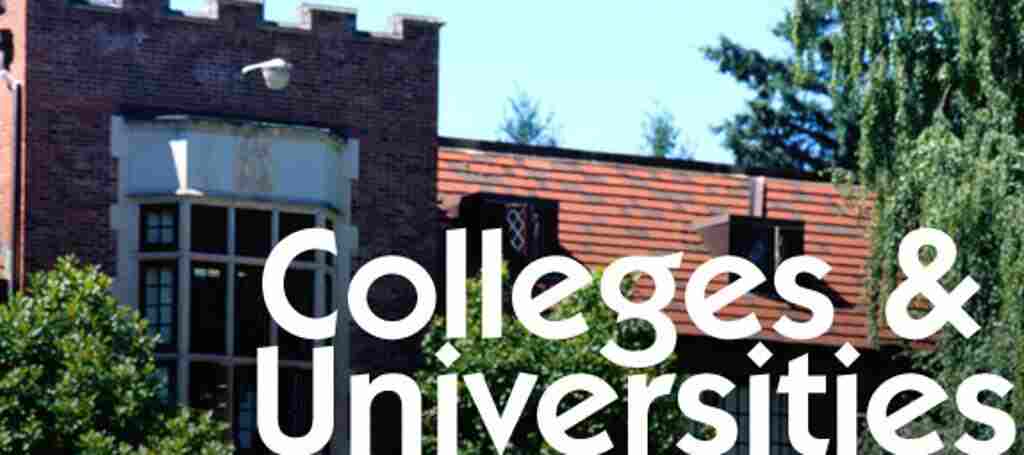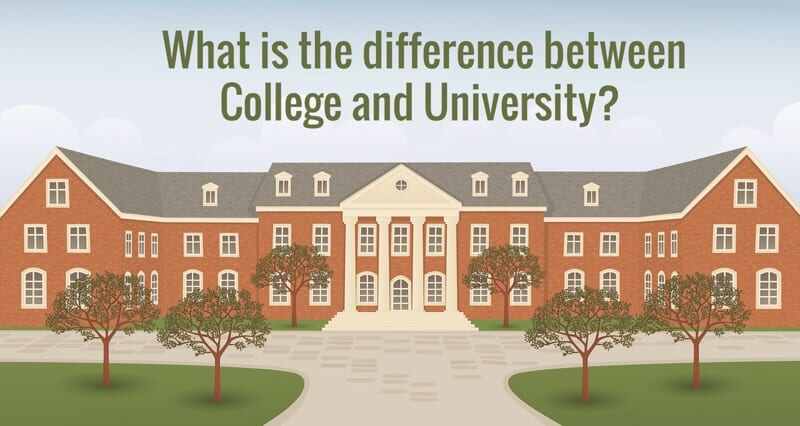What’s the difference between college and university? This article will be tailored in a way it will provide a holistic answer to the question “what’s the difference between college and university?” and other pieces of information about the Colleges Vs Universities debate.
Even though colleges and universities both offer tertiary education, it doesn’t make them the same. Colleges and universities though often used interchangeably in the United State of America most especially are both very different from each other. Hence, the reason for this article today is to inform you and help you understand the Colleges VS Universities, which is the differences between Colleges and Universities.

The Term “Schools”
It may come as a surprise when American students talk about their universities and colleges as schools, but referring to universities and colleges as schools is common in the US. It’s just an easy way to talk about universities and colleges.
So whenever you hear someone mention “school,” remember they’re probably not talking about high school.
Now you know that all universities and colleges can be called schools, and some colleges are technically universities, you can get a little familiar with the terminology used in the American education system.
The rest of the world defines colleges and universities differently, so keep this in mind when researching study abroad options as an international student.
Colleges VS Universities: Definition of Terms
Before we start pointing out some of the differences between colleges and universities it is important that we state what these terms are, their advantages and disadvantages.
What is a University?
A university is an institution of higher learning, both for education and research that offers undergraduate and postgraduate programs which award degrees at the end of the academic program.
University is known for its diverse and large campuses, environment and broad varieties of programs. Universities are divided into both public and private universities. Private universities are more selective and smaller in size while public universities are bigger and enrol more students than private universities.
Universities are generally inclined to research, carrying out official research worth billions of dollars sometimes led by highly qualified professionals in the field.
You will know more when we dive into the Colleges VS Universities discussion proper.

Also Read: Difference between fellowship and scholarship
Advantages of Universities
- Earning a university degree will most likely lead to more well-paid professional openings after your degree.
- Due to the diverse and broad environment, you get to meet, learn, network and work alongside different unique people on a larger scale.
- Opportunity to choose from a wide range of programs that best suits you and your future plans.
- The abundance of resources and opportunities.
- More scholarship opportunities and financial aid.
- Offers postgraduate degrees
Disadvantages of Universities
- The total covering the cost of attending a university is high and maybe limiting for some people.
- With too large classes, some students may feel lost.
What is a college?
‘College’ refers to an educational organization equipped with providing higher education, specialized skills, or professional training. It is also often a part of a university providing vocational or pre-requisite education.
Colleges are often small and commonly feature a lesser quantity of students’ population with emphasis on the undergraduate degree.
Colleges VS Universities which we have expressly discussed in this article will open you up to more understanding of colleges and how to choose the best school for yourself.
Types of colleges
In a bid to make fully understand Colleges VS Universities which is the differences between Colleges and Universities is important that the types of colleges are listed and discussed. The different forms of colleges are broadly divided into:
Community colleges:
This is common both in the united states of America and the United Kingdom. Community college is an education institute that serves its community by offering classes that prepare students for the university or a full-fledge college and also by providing lessons such as swim classes for children or preparatory classes for job seekers.
With a community college degree, one need only begin from the third year in the university or full-fledged college. This is because the preparatory classes and general education requirement has been met at the college.
Vocational colleges:
Vocational colleges or schools refer to the educational institute where post-high school students learn skills and are intended to build them in a particular area of their choosing. This school or colleges help prepare the student for a particular skilled trade. Trade such as electrical, cosmetologist, paralegal etc. this is very common in the United State of America.
Liberal arts colleges:
This college refers to an educational institute that covers majors in the art, social and natural science, humanities and all fields that help with building communication, critical thinking and problem-solving skills. It is most common in the United States but prevalent all over the world.
Also Read: What are the Disadvantages and Advantages of Sole Proprietorship?
Advantages of Colleges
- More friendly and comfortable with a tight sense of community.
- The size of the class is smaller.
- Slow-paced and inclusive, carrying everyone along.
- Less expensive.
- The application process is easier
- General low risk.
Disadvantages of Colleges
- The educational experience it offers is generally basic, therefore you may need a university degree if you need a job that requires one.
- Lack of competition
- Hardly any meal plans or campus housing.
- Do not offer post-graduate degrees
Colleges VS Universities: Similarities between Colleges and Universities
before we move into the differences between Colleges and Universities proper, let us look into the similarities of these terms always used interchangeably
As you may have already noticed, universities and colleges are some worth inter-related and therefore have some similarities. This includes:
- They can both be public or private.
- They both give higher educational degrees.
- They both require the applicants to have finished high school.
Colleges VS Universities: What’s the difference between college and university?
What’s the difference between college and university? To answer this question properly, we will list some of the factors that mainly contribute to the differences between colleges and universities.
These factors include:
- Size
- Cost
- Resources
- Program
- Time frame

Size
In analysing Colleges VS Universities one thing that makes the paramount difference here is the size of these two. Universities tend to have bigger classes compared to colleges.
Most universities surpass the ideal class maximum number which has been shown to have a link with students having lower grades.
Students who especially prefer small class numbers and a tight-knit community sense of feel could tend towards attending a college, as this allows for a more tailored teaching and departmental assistance.
Cost
One of the major issues when it comes to higher education is money and the cost of paying for the education, and this will help to answer the question: What’s the difference between college and university?
Attending a university is more expensive than attending a college, as they have more cost per year than colleges.
The reason for the higher cost is due to the amenities provided by the universities that are not readily provided by colleges.
These include housing, meal plans and other supplies. But in a college is a relatively more affordable option as the costs usually just cover tuition and fees.
Unless you get a good-paying job after higher education to pay off your student loans or reserves, you may find yourself having lost money as you will keep paying off those universities’ debts for a very long time.
Resource
This is a key factor in analysing Colleges VS Universities. Resources in the form of financial aid and scholarships are mostly found in universities.
Many universities have provision for scholarships, financial aid and/or funding of research, which is provided by alumni, any of the school department, individuals, the school in general or professional bodies. So, if you are looking for scholarship opportunities, universities are the way to go.
Program
Universities most often time have postgraduate programs and a wide range of courses that colleges do not possess or have.
College institutions education on their own usually stops after the completion of college with no further education provided. Also, colleges are less focused on research compared to the university.
Time frame
in answering the question: What’s the difference between college and university? time frame is a major factor to consider.
The time frame for a University undergraduate degree is usually between four to six years depending on your course of study.
While a college usually offers two years programs which translates to a limited curriculum as they do not offer the same broad programs.
Colleges VS Universities: Is the university better than a college?
It depends on your point of view and needs as both offers academic degrees. The university is best suited for those who are interested in graduate opportunities and research while the college may be the best fit for those who are interested more in the technical and vocational profession and training.
Factors to consider when choosing your school?
We have tried as much as possible to analyse the Colleges VS Universities in terms of differences and similarities. But irrespective of what type of school you want to attend, there are some things you need to bear in mind and also put into consideration if you are to choose the best school for yourself; a few of them are what we have discussed below.
Program
Does your preferred institute offer the majors you have in mind? Also, check for your desired majors and does closest to it if the institution has it.
Cost
The cost of education and its long-term effect if paid on debt cannot be overemphasized. Do check for the cost of the education and if the school financial aid is available for you. The cost of school tuition is not a measure of the quality of education you are likely to receive, so do not let it scare you or think poorly of it. Do your research.
Location
Moving to school from the house can tell on us sometimes, so ensure to find out about the proximity to your home, the surrounding, transportation cost, the weather in the school location especially for international students moving from region of hot climate to cold climate and vice versa etc.
Student activities
Especially if you were very active in your high school either playing football or basketball, doing research about your intended university or college in this area is key as it will help you know if you can keep pursuing them there.
Campus facilities
Check out the institution’s medical care, grocery store, banks, recreational opportunities such as fitness classes etc, their residence halls and the types they have available alongside the cost.
This is because you will be practically staying there and would need to be comfortable doing so.
Should you go to college or university?
Depending on their goals and preferences, some students may be better suited to a university or college. I’ll give you some basic guidelines on which types of students are more likely to thrive in each setting.
You go to a college if:
- You are looking for a close-knit community where you will always meet people you know.
- You enjoy close relationships with teachers and enjoy small class discussions.
- You are looking for a dedicated undergraduate degree rather than an undergraduate degree as a stepping stone to a graduate degree.
- You think you will be more comfortable receiving a higher level of personal attention and academic instruction.
- You have not yet decided on your major and overall academic goals for the next four years.
You may be a better fit for university if:
- You are looking for a large and dynamic community where you will always meet new people and take part in different activities.
- You want to do your research as an undergraduate and you don’t mind the hassle of large class sizes.
- You are resourceful and independent in pursuing your interests.
- You wish to obtain some kind of postgraduate degree.
- You are more certain about your academic and career goals.
What’s the difference between college and university? Conclusion:
The question What’s the difference between college and university? is a regular question between students, and we believe that when students understand the difference between these two terms, it will help them make better academic decisions.
If you need more information about scholarships, academic opportunities and other academic-related tips you can leave us a comment in the comment section and we will provide you with the information you need.

Leave a Reply